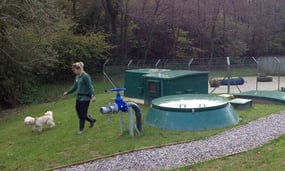We’re on LinkedIn!
Connect with WCS Environmental Engineering Safe Efficient Compliance

One of the obvious challenges of running Dogs Trust rehoming centres is the need to dispose of a significant quantity of hazardous waste. All locations not connected to mains drainage have to be served by reliable on site treatment systems and on completion of the latest installation at Salisbury a total of five HiPAF systems (off mains drainage) will be in operation around the UK.
The charity cares for some 16,000 dogs a year at 18 rehoming centres and several centres were issued with improvement notices by the Environment Agency due to failure of existing package treatment plants to meet the required standard of treated effluent discharge. The Trust initially approached specialist waste water contractor Warwick-based Soma Services for help.
Graham Hyde, Soma’s Technical Sales Director, said, “Soma was asked to look at on- going performance problems as well as supply of new equipment. Management of the sites, inparticular the use of disinfectants, was reviewed, along with plant-sizing.”
The need for more effective routine maintenance was identified in there view, along with the need to up-rate equipment at several locations.
The design and manufacture of a modular HiPAF treatment plant with a Robust Aerobic Digestion System (RADS) to treat the hazardous waste. The HiPAF is most appropriate for commercial and domestic applications where the site is not connected to mains drainage and is well suited to difficult situations such as the treatment of dog and other animal waste.
This compact plant contains primary settlement, biological treatment and final settlement modules housed in glass-reinforced plastic tanks which can be installed above or below ground.
Introduction of RADS has significantly reduced desludging costs at Dogs Trust centres as the process reduces sludge volume requiring tankerage offsite. These benefits are compounded by there categorisation of the aerobically treated sludge as domestic waste rather than dog waste – previously the dog waste had to be booked in to the main sewage treatment works as a special load at a higher cost.
Graham Hyde said, “Soma has been involved with the drainage design from the early development stages of all the new and redeveloped centres and operates as a specialist sub-contractor on these developments. Recent moves towards rolling out RADS technology at other sites served by package sewage treatment systems will not only ensure optimum performance,but will provide significant savings in tankerage costs.”
Simon Kimber, Sales Director said, “We’re very impressed with the work that Dogs Trust does and are pleased to supply our specialist treatment systems to ensure compliance with environmental legislation.”
Paul Wass, Project Surveyor for Dogs Trust said, “We are very happy with the work that's been done for us over the past eight years and in particular the development of the RADS system. This has made a significant difference to the amount of desludging that we have to have carried out on our installed systems and has dramatically reduced the associated costs.”
With nutrient neutrality requirements being enforced at off-mains properties in areas of England, homeowners need to ...
Why managing variable loads matters If you have an off mains wastewater treatment system operating at a hospitality, ...
Trade effluents are liquid waste streams discharged into public sewers from businesses and industrial processes. Their ...
Connect with WCS Environmental Engineering Safe Efficient Compliance
WCS Group is a trading name for WCS Environmental Ltd, registered in England and Wales (Number 02184649) at 20 Grosvenor Place, London, SW1X 7HN. Head Office – 17 Wheatstone Court, Waterwells Business Park, Gloucester, GL2 2AQ. WCS Group is a Marlowe Critical Services Company owned by Marlowe plc. 2025© WCS Environmental Ltd.